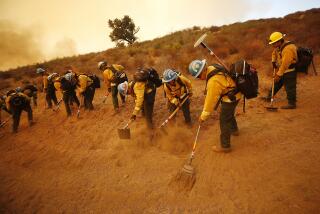Vermont Program Helps Teen-Agers, Labor Shortage : Farmers Reap Benefits of Youth Corps
- Share via
CRAFTSBURY, Vt. — Teen-agers Beth Young and Nate Deslandes have no desire to spend their lives baling hay and milking cows, but they didn’t mind spending the last two months in a program intended to give them farm experience while giving farmers a hand.
“We’ve had some problems, but we had some really nice success stories too, and we had some farms having some good experiences,” said Greg Voorheis, who runs the Farm Youth Corps, a pilot program for the state Department of Employment and Training.
The corps matched people ages 16 to 21 from northern Vermont with farm jobs. The goal was to alleviate a labor shortage while the young people gained experience and money for a summer’s work.
Keen Competition
Farmers around the Northeast have especially had trouble hiring help since wages at hamburger establishments have risen to $6 or $7 an hour. Few farmers can offer more than $4 an hour for harder work, longer days and fewer benefits.
“One of my friends said he knew a kid who said, ‘I don’t touch a bale for less than $7 an hour,’ ” John Lincoln of Westfield said.
The Farm Youth Corps took care of the problem of finding young people who were willing to work for less money. A combination of state and federal funds, plus some volunteers, provided training.
The farmers pay their hired hands $4 an hour, and state funds will pay the youths a $1-an-hour bonus at the end of the summer.
Grew Out of Survey
The idea for the corps came out of a survey of Vermont’s 2,500 dairy farms. More than one-third of the 700 respondents said a lack of employees kept them from expanding. Nearly two-thirds said they would consider hiring young Vermonters for the summer if the state would help find them.
Young, 17, hooked up with Jim Jones, a Craftsbury farmer.
“I like being outdoors and I’ve been around a farm,” said Young, who rides her bike 2 1/2 miles to Jones’ farm each day. “I like the animals. I think I like milking--it’s nice after working hard in the woods all day--and just joking with Jim or whatever.”
The experience helped confirm that she had rather not farm for a living.
“It’s a lot of hard work and it’s stressful,” she said. “But I think (the corps) is a good idea because farmers need help, and I think kids are a lot more willing to work than people think.”
8 Leave Program
Most kids. Voorheis said eight of the 20 youths dropped out of the program.
Young’s supervisor, Danny Paquin, said one girl dropped out because she couldn’t stand the thought of sending cows and calves to slaughter.
And some couldn’t handle a tractor. “One farmer tried to teach one of the kids, and he was almost run over himself,” Paquin said.
Paquin also had a problem with a young woman who refused to eat from her employer’s table.
“Her family background--these people just eat out of cans. We’re talking Chef Boyardee and Franco American. She wouldn’t eat fresh vegetables,” Paquin said.
Before going out to the field, 16-year-old Deslandes and the others spent a week in classes at a state technical college, where they learned crop and livestock management, milking techniques and tractor safety.
He’s a Convert
“He didn’t want to go at first. He didn’t think he’d need it,” Lincoln said of Deslandes. “Now he wants to go back and do more.”
“It gives me a lot of experience in mechanics and carpentry and different kinds of trades,” said Deslandes, of Westfield, whose buddies are spending the summer baby-sitting or working in stores.
He also learned about growing up.
“Responsibility. There’s a lot of trust, I think, that goes into it,” he said. “I trust him, he trusts me. I think the responsibility’s the No. 1 thing. It makes you work a lot harder on goals.”
More to Read
Sign up for Essential California
The most important California stories and recommendations in your inbox every morning.
You may occasionally receive promotional content from the Los Angeles Times.










